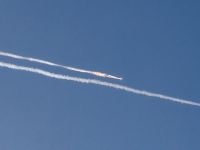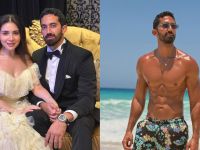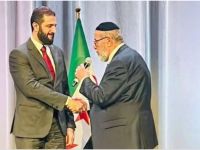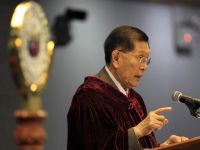Russian scientists told a Moscow court Wednesday that military documents received by US spy suspect Edmond Pope were "top-secret," even though defense lawyers claimed the information was available on the Internet.
Two court-appointed experts, Yury Fadeyev and Georgi Logvinovich, conceded that some information on Russia's high-speed underwater "Shkval" missile had already been published, but said the material was still classified.
"The five documents passed to Pope have not lost their 'secret' classification, and are not about to lose it," Fadeyev told reporters after testifying at the trial, which is being conducted behind closed doors.
"We may sometimes outline the high-speed torpedos for our foreign clients, but that doesn't mean information about the Shkval is not secret," he added.
Pope, a 54-year-old retired US naval intelligence officer, admits that he received some information on Russia's new naval defense systems from a Moscow-based scientist.
But he says he was merely gathering material on behalf of his hi-tech company, which was interested in civilian applications of the technology.
Pope's lawyer, Pavel Astakhov, said the defense had asked the experts in court Wednesday if the material was readily available on the Internet, adding: "And they replied, yes, it was."
But Fadeyev told reporters that special journals had only published some technical information about the export model of the torpedo, the Shkval-E, which was different from the weapons system used by the Russian military.
Speaking outside the courtroom, Astakhov criticised the scientific investigation, which he said had not been carried out in a lawful or impartial way.
"The expert analysis was neither complete nor objective. We are going to demand a new one," he said.
Pope and his lawyers submitted around 100 questions to the expert panel Monday, but only seven of them were approved by the prosecutor, while not even all the experts had examined the evidence in person, he charged.
The lawyer said that only two of the four court-appointed scientists had actually looked at the controversial documents, adding: "And these were the two experts who were the most conservative.
"The other two gave their expert opinion by telephone, which is a violation of the law," Astakhov said.
"It is practically impossible to discuss the degree of secrecy of the documents in a telephone conversation."
Pope faces up to 20 years in prison if convicted of illegally obtaining secret documents relating to Russia's high-speed underwater "Shkval" missile.
Meanwhile the lawyer presented to the court a letter written by 68-year-old American citizen Daniel H. Kiley, who was arrested with Pope last April but later released because of his age.
Kiley, who returned to the United States immediately after being released, claims in the letter to US embassy diplomats in Moscow that the Russian authorities never explained to him why he had been detained.
In the letter Kiley alleges the investigators made him sign a statement written in Russian on the grounds that, if he cooperated, Pope would also be released in a matter of days.
Pope has been held at Moscow's Lefortovo prison since his arrest last April.
The trial, now adjourned until Monday, has sparked an outcry in the United States, with top Washington officials calling on Moscow to release Pope, who suffers from a rare form of bone cancer, on humanitarian grounds -- MOSCOW (AFP)
© 2000 Al Bawaba (www.albawaba.com)







